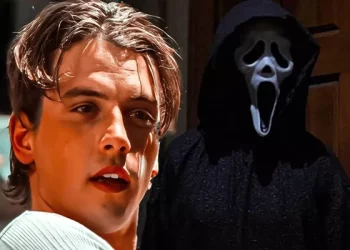Psychological thriller movies have a unique ability to captivate audiences, engaging them in intricate plots, intense character development, and mind-bending twists. They delve deep into the human psyche, leaving viewers on the edge of their seats while challenging their perceptions and intellect. Over the years, several films have stood out as masterpieces within the genre, delivering spine-tingling experiences that linger long after the credits roll. Let’s explore a selection of the best brain-burning psychological thrillers that have left an indelible mark on cinematic history.
1. “Psycho” (1960)
Alfred Hitchcock’s “Psycho” stands as a monumental achievement in the realm of psychological thrillers. The film follows the unsettling story of Marion Crane, who encounters the enigmatic Norman Bates at the eerie Bates Motel. What ensues is a haunting exploration of madness, obsession, and the human psyche. Hitchcock’s masterful direction and the unforgettable shower scene have cemented “Psycho” as a timeless classic, setting a benchmark for the genre’s future endeavors.
2. “The Silence of the Lambs” (1991)
Adapted from Thomas Harris’s novel, “The Silence of the Lambs” showcases the spine-chilling encounters between FBI trainee Clarice Starling and the incarcerated, cannibalistic psychiatrist, Dr. Hannibal Lecter. This gripping narrative of psychological manipulation and pursuit of a serial killer is elevated by Anthony Hopkins’ iconic portrayal of Lecter. The film’s atmospheric tension and intricate character dynamics make it an undisputed masterpiece and a quintessential entry in the genre.
3. “Memento” (2000)
Christopher Nolan’s “Memento” is a cerebral tour de force that challenges conventional storytelling. The film follows Leonard Shelby, an amnesiac on a quest to avenge his wife’s murder. Presented in a non-linear narrative, the story unfolds backward, immersing viewers in Leonard’s fragmented reality. “Memento” is a gripping exploration of memory, identity, and the consequences of a fractured mind, showcasing Nolan’s directorial brilliance and narrative innovation.
4. “Black Swan” (2010)
Darren Aronofsky’s “Black Swan” plunges audiences into the competitive world of ballet, following Nina Sayers’ psychological descent into madness as she strives for perfection in her performance as the Swan Queen. Portrayed by Natalie Portman in a mesmerizing performance, Nina’s internal struggles and delusions blur the line between reality and hallucination, delivering a haunting and visually stunning psychological thriller.
5. “Shutter Island” (2010)
Directed by Martin Scorsese and based on Dennis Lehane’s novel, “Shutter Island” delves into the mysteries surrounding a psychiatric facility for the criminally insane. U.S. Marshal Teddy Daniels, portrayed by Leonardo DiCaprio, investigates the disappearance of a patient, leading to a labyrinth of secrets and psychological twists. Scorsese’s signature style, coupled with DiCaprio’s compelling performance, creates an atmospheric and perplexing journey through the depths of the human mind.
6. “Se7en” (1995)
David Fincher’s “Se7en” is a dark and haunting exploration of the human psyche set against the backdrop of a series of gruesome murders inspired by the seven deadly sins. Detectives Somerset and Mills, played by Morgan Freeman and Brad Pitt, respectively, navigate a grim and relentless pursuit of a sadistic serial killer. The film’s brooding atmosphere, coupled with its thought-provoking themes, culminates in a chilling and unforgettable conclusion.
See Also: The 10 Best Thrillers on Netflix to Watch Now
7. “The Sixth Sense” (1999)
M. Night Shyamalan’s “The Sixth Sense” redefined the twist ending and psychological thriller genre with its intriguing story of a young boy who communicates with the dead. Child psychologist Dr. Malcolm Crowe, portrayed by Bruce Willis, attempts to help the troubled boy while grappling with his own unresolved issues. The film’s carefully crafted narrative and unexpected revelations have solidified its place as a cinematic landmark.
8. “Fight Club” (1999)
Adapted from Chuck Palahniuk’s novel, “Fight Club” directed by David Fincher, delves into the psyche of an insomniac office worker (Edward Norton) who forms an underground fight club with the enigmatic Tyler Durden (Brad Pitt). This cult classic challenges societal norms and explores themes of identity, consumerism, and disillusionment. With its mind-bending twists and charismatic performances, “Fight Club” continues to resonate with audiences worldwide.
9. “Inception” (2010)
Christopher Nolan’s “Inception” is a visually spectacular and intellectually stimulating film that explores the intricacies of dreams and subconsciousness. Dom Cobb, portrayed by Leonardo DiCaprio, leads a team skilled in the art of extracting information from dreams. The film’s complex narrative, stunning visuals, and philosophical depth catapult viewers into a world where reality and dreams intertwine, leaving audiences questioning the nature of perception and reality itself.
10. “Gone Girl” (2014)
Based on Gillian Flynn’s novel, “Gone Girl” directed by David Fincher, unravels the complexities of a seemingly perfect marriage turned tumultuous after the disappearance of Amy Dunne (Rosamund Pike). Ben Affleck portrays Nick Dunne, Amy’s husband, who becomes the prime suspect. The film’s intricate plot twists and exploration of deception, media scrutiny, and the facade of relationships make it a gripping and thought-provoking psychological thriller.
In Conclusion
The realm of psychological thriller movies is a treasure trove of cinematic brilliance, offering a diverse array of narratives that delve deep into the complexities of the human mind. Each film mentioned above represents a pinnacle of storytelling, leaving an indelible mark on the genre with their gripping narratives, unforgettable performances, and mind-bending twists. These movies continue to enthrall audiences, challenging perceptions, and inviting viewers to explore the intricate labyrinth of the human psyche.
Whether it’s Hitchcock’s chilling suspense in “Psycho,” Nolan’s mind-bending narrative in “Inception,” or the psychological unraveling depicted in “Black Swan,” these movies stand as testament to the enduring allure of brain-burning psychological thrillers that continue to captivate and fascinate audiences across generations. As the genre evolves, these timeless classics serve as a testament to the enduring power of storytelling that stimulates the mind and leaves an everlasting impact on those who dare to venture into their intricately woven narratives.
























